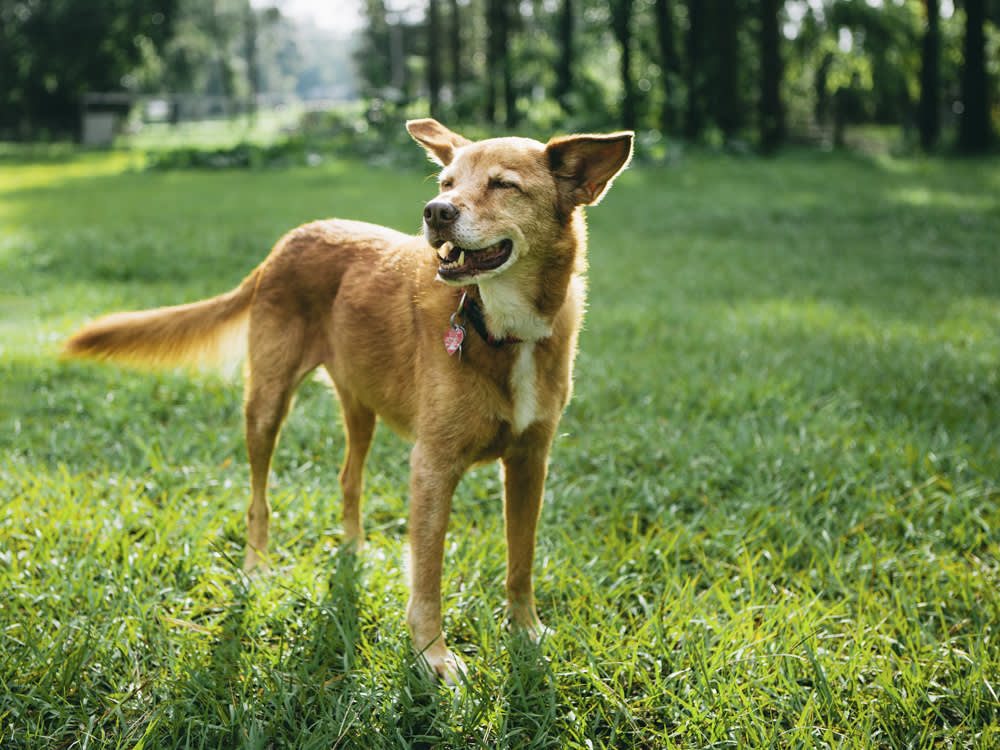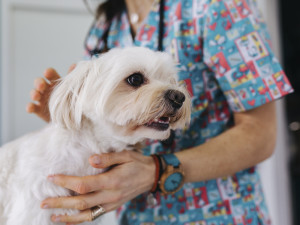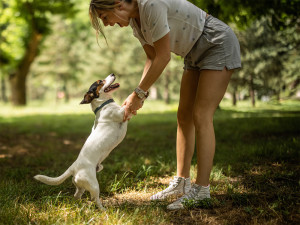Laryngitis in Dogs: Causes and Treatment
Vet advice on when you should be worried.

share article
In this Article:
Types of Larynx Disease In Dogs opens in a new tab Laryngitis in Dogsopens in a new tab Laryngitis Treatmentopens in a new tab Laryngeal Paralysis in Dogsopens in a new tab Laryngeal Paralysis Treatmentopens in a new tab
Let’s just get it out there: For a dog, coughing, unlike sneezingopens in a new tab, is never “normal.” As a small-animal veterinarian, I hear this all the time. Clients tell me that their dog has been coughing for a while or off-and-on or when they’re excited or after pulling on the leash or while going to the groomer — they think the dog is “OK.” But a history of coughing always raises a red flag with me.
Coughingopens in a new tab is caused by an irritation or inflammation of one or more of the dog’s respiratory organs. A problem anywhere in that system — the larynx, in the back of the throat; the windpipe; the airways (bronchi); or lungs — can cause your dog to cough. Heart disease, which is closely tied to the lungs and airways, also causes coughing.
Sometimes, the cause of a dog coughing is benign, like a small bout of tracheobronchitis (an infectious inflammation of the airways more commonly referred to as “kennel coughopens in a new tab” ) that resolves easily with medication and has a vaccine (Bordetella). Sometimes, the cause is more worrisome; collapsing airways, pneumonia, a piece of grass or bone stuck in the back of the throat, parasites, laryngeal paralysis, or a cancerous tumoropens in a new tab that is pushing on respiratory structures can all cause a dog to cough.
Learn all about why dogs cough and what symptoms to look out for in your pup, as well as when to consult your veterinarian.
Why dogs cough
When coughing is due to a problem in the laryngeal area, it can be a real pain in the neck, both literally and figuratively. And new research is showing that more coughing dogsopens in a new tab have laryngeal problems than previously thought.
The anatomy of a dog’s throat is much the same as that of a human’s.The larynx (the area between the nose and the trachea), trachea (windpipe), epiglottis (a flap of cartilage at the root of the tongue that is depressed during swallowing to cover the opening of the windpipe), and esophagus are the same in both. As well as housing the voice box, the larynx serves to protect the lower airways — trachea, bronchi, and lungs — from foreign material and germs. The larynx is lined with secretory membranes and comprises muscles, cartilage, and ligaments.
What are the types of larynx disease in dogs?
There are several types of larynx diseasesopens in a new tab that dogs can contract, including:
Laryngitis: a relatively commonopens in a new tab inflammation of the larynx
Laryngeal edema: a swelling caused the accumulation of fluid in the tissues of the larynx
Laryngeal tumors: masses or growths on the larynx
Laryngeal chrondropathy: an infectious condition in the cartilage, which is usually caused by injury from a foreign material (like a stick)
Laryngeal paralysis: the most common larynx disease, resulting from the degeneration of the nerves and muscles that open and close the larynx
Laryngitis in dogs
Like humans, dogs can develop laryngitisopens in a new tab, an inflammation and swelling of the larynx secondary to infection, irritation by dust or smoke, inhaled foreign bodies (grass, bones), or trauma due to excessive barkingopens in a new tab or pulling against a collaropens in a new tab. Older dogs can also develop laryngeal paralysis, a condition in which the muscles that move the arytenoid cartilages (a pair of pyramid-shaped pieces of cartilage that open and close during breathing) stop working.
Dogs with laryngeal disorders typically exhibit what are called “upper airway signs,” such as changes in their bark; loud breathing that sounds like “roaring”; and a dry, hacking cough that can be exacerbated by pressure on the larynx. Other upper airway signs that clue veterinarians into a laryngeal problem include difficulty swallowing, bad breath, and an extended neck. A dog with laryngitis looks like they have a sore throatopens in a new tab. When veterinarians see these signs, we suspect laryngeal disease and point our efforts in that direction. If we don’t see them, we look for other causes of coughing farther down the respiratory tract.
Generally, coughing dogs are not extensively evaluated for problems with their larynx. However, a study conductedopens in a new tab by veterinarian Dr. Lynelle Johnson, PhD, at the University of California, Davis, School of Veterinary Medicine showed the importance of checking all chronically coughing dogs for signs of laryngeal issues. The study found that a majority of coughing dogs who didn’t exhibit classical upper airway signs associated with the larynx had a laryngeal disease that may have gone undiagnosed. This study showed that they should be evaluated and that we should be aware of the possibility of a hidden condition.
Interestingly, Dr. Johnson found that 19 percent of the dogs examined because of cough alone (no upper-airway signs) also had some form of laryngeal dysfunction, ranging from laryngitis to swelling to laryngeal paralysis. Dogs with an acute cough were not observed to have laryngeal inflammation, but it was noted in more than half of the dogs who had been coughing longer than two weeks.
Results also indicated that dogs with a cough of more than two weeks’ duration commonly have laryngeal swelling regardless of the underlying problem. This makes sense, as chronic coughing irritates the throat. Laryngeal paralysis or partial paralysis was also fairly common, seen in 19 percent of the dogs with a cough of more than two weeks’ duration. Remember, these animals had none of the classical signs or side effects of laryngeal paralysis in dogs, such as excessive pantingopens in a new tab and loud breathing. The problem was only diagnosed when their throats were scoped.
Once their laryngeal problems were correctly diagnosed, the dogs received focused testing and treatment.
What are the symptoms of laryngitis in dogs?
Symptoms of laryngitis can often be mild, which can cause pet parents to miss them. The most common sign of laryngitis is coughing, particularly after any form of exertion or exercise. Other symptoms include:
Loud breathing (sometimes called “roaring”)
Excessive panting
Change in the sound of barking (known as dysphonia)
In more severe and sudden cases, dogs may develop respiratory distress, as well as bluish mucous membranes in the mouth; they may even collapse.
What are the causes of laryngitis in dogs?
In most cases, laryngitis develops as a result of an upper respiratory infection or irritation resulting from inhalation of smoke, dust, or foreign objects.
How to treat dogs with laryngitis
In dogs with laryngitis, treatment includes antibiotics if appropriate, as well as anti-inflammatories and pain medication. (Laryngitis hurts!). When the inflammation is caused by allergiesopens in a new tab, a vet will address that issue. A dog with a swollen larynx also benefits from humidified air; a warm, clean environment; and soft food. Dogs with a weak or paralyzed larynx can be treated surgically or may require hormone therapy; there is anecdotal evidence that laryngeal paralysis in dogs may be related to hypothyroidism. Those whose dogs have laryngeal paralysis need to be advised on how to prevent overheating and aspiration pneumonia, as well as be informed of the links between paralysis and systemic neuromuscular diseases and megaesophagus.
The finding that dogs have laryngeal disease even when they don’t have the classic signs has significant implications. If we, as veterinarians, aren’t scoping these coughing dogs, we might be missing something. The bottom line: If your dog has been coughing for more than two weeks, or if the cough doesn’t resolve with medication, talk to your vet about further medical evaluation.
Laryngeal paralysis in dogs
The most common form of larynx disease in dogs is laryngeal paralysis. In this condition, the nerves of the laryngeal muscles become weak or even paralyzed. As a result, these muscles relax, and the cartilages collapse inwards, making breathing more difficult.
What are the symptoms of laryngeal paralysis in dogs?
Loud breathing or an increase in panting is often the first sign of this condition. For laryngeal paralysis in dogs, early symptoms include:
Lethargy or reluctance to exercise or exert themselves
Changes in voice
Coughing or gagging when eating or drinking
Dark red, purple, or blue gums
Anxiety
Heat stroke
Symptoms are usually gradual and grow progressively worse over time. Dogs with laryngeal paralysis are more likely to overheat in hot or humid weather because they can’t easily cool themselves down by panting. This condition can lead to heat stroke, respiratory distress, or, in serious cases, collapse.
What are the causes of laryngeal paralysis in dogs?
Laryngeal paralysis can be congenital, but in most cases a dog will acquire the condition later in their adult life. Some of the potential causes of laryngeal paralysis in dogs include a neurological condition called Geriatric Onset Laryngeal Paralysis Polyneuropathy (GOLPP), which occurs in dogs who are 10 years old or older. Laryngeal paralysis is thought to be a symptom of this condition. In some rarer cases, the disease can be caused by nerve damage, which affects the larynx, usually from an injury or lesion.
Do certain breeds more commonly develop laryngeal paralysis?
Some breeds are more prone to developing laryngeal paralysis. The Labrador Retriever is most commonly affected. Look out for symptoms of laryngeal paralysis in dog breeds such as the Siberian Husky, Bull Terrier, and the Dalmatian, all of which are more likely to have the congenital form from birth.
Laryngeal paralysis is more likely to develop later in life in giant and large-breed dogs, including:
Labrador Retriever
Golden Retriever
St. Bernard
Irish Setter
Newfoundland
How veterinarians diagnose laryngeal paralysis in dogs
Veterinarians develop a diagnosis of laryngeal paralysis in dogs based on the animal’s medical history and observation of the common symptoms. A veterinarian will often recommend a thorough diagnostic screening, which includes a blood panel, thyroid testing, and x-rays of the neck and chest area. They will have to examine the larynx with an endoscope or a laryngoscope to confirm the diagnosis.
How is laryngeal paralysis treated?
Treatment for laryngeal paralysis in dogs varies depending on the severity of the disease. For mild cases, dogs often only need medications, such as antibiotics, anti-inflammatories, and sedatives to help control their symptoms.
Dog parents can also help maintain their dog’s comfort and reduce the severity of symptoms by:
Avoiding hot and humid environments
Limiting strenuous exercise or exertion
Reducing stress and anxiety
Using a harness instead of a collar, which can put pressure on the dog’s neck
What does surgery for laryngeal paralysis involve?
Most severe cases of laryngeal paralysis are treated with surgeryopens in a new tab, which is usually successful at reducing or even eliminating symptoms. For laryngeal paralysis in dogs, surgical treatment usually involves a procedure called arytenoid lateralization by tie-back. In this procedure, two permanent sutures are placed to hold open part of the larynx, which allows air to pass through more easily. While surgery can’t restore the function of the larynx, it can dramatically improve a dog’s life.
FAQs (People also ask):
Can laryngeal paralysis be managed without surgery?
Mild cases of laryngeal paralysis can be managed with medication, but most severe cases require surgery.
Can laryngeal paralysis be cured?
Unfortunately, laryngeal paralysis cannot be cured, but surgery is often very effective in improving or eliminating symptoms. Most dogs do well with medical and surgical treatment to manage their laryngeal paralysis.
What is the cost of laryngeal disease surgery in dogs?
The cost of laryngeal disease surgery varies depending on the type of procedure, as well as factor’s like your dog’s size and the severity of their condition. On average, this surgery usually costs between $3,000 and $6,000.
References:

Sarah Wooten, DVM
Sarah Wooten is a small animal veterinarian and certified veterinary journalist. She practices in Greeley part time at Sheep Draw Veterinary Hospital, and writes for multiple online and print publications.






